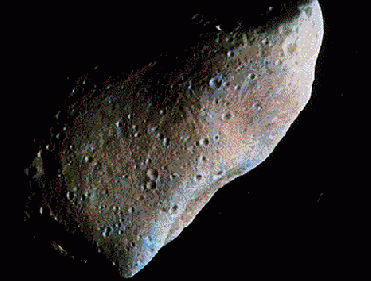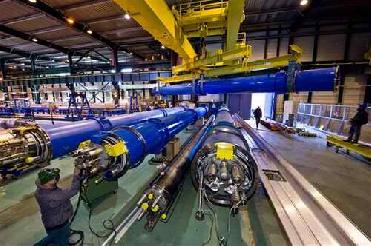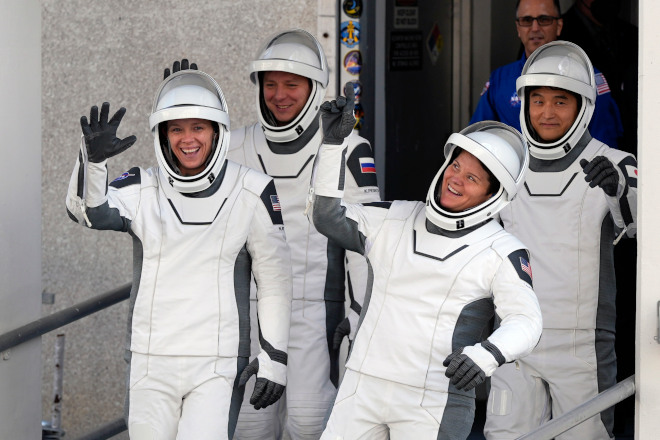
Asteroid Gaspra, as viewed from the Galileo spacecraft. NASA photo
WASHINGTON (BNS): The international community must work together to ward off an impending threat of asteroids colliding with the Earth, leading analyst for the United Nations Professor Richard Crowther said.
Space experts belonging to the Association of Space Explorers (ASE) believe that the planet may be threatened by Asteroid Apophis in the next 20 years. The asteroid Apophis striking the Earth is a one in 45,000 chance, space experts believe adding that if it happens it would be at least 100 times more powerful than the Tunguska impact in Siberia. In the Tunguska impact of 1908, the asteroid produced a fire large enough to engulf the city of New York. If we look back to history an asteroid impact 65 million years ago wiped out the dinosaurs.
Chairing the UN Working Group on Near Earth Objects (NEO), Crowther said that the issue is it's a single event, potentially causing a large number of casualties. The UN agrees with the report of the ASE that a coordinated response to the threat and say to the asteroid mission will need global approval.
Welcoming the ASE-NEO report, Crowther said that a lot of what�s in the report is consistent with what we're suggesting anyway, there needs to be effective scientific coordination, enough observatory time, and people looking in the right place at the right time. The report states that asteroids larger than 200m in diameter need to be deflected away from the Earth, while asteroids smaller than 200m will likely burn up upon entering the Earth�s atmosphere.
Some of the proposed methods of deflecting the asteroids include crashing spacecraft into the object, or setting it off course with a nuclear explosion. Researchers agree that dealing with the threat early will mean a less drastic course of action. However, the UN analyst believes the natural force of gravity can be used to deflect asteroids.
�We can use the natural attraction of a probe to one of the bodies, to slowly pull the object away. If done from a sufficient distance from the Earth, the orbit of the asteroid could be changed enough to remove it from a collision path,� Crowther explained.
The ASE report proposes that scientific monitoring be combined with a global political strategy to find the best way to deal with asteroids. The UN expert feels that achieving a political consensus to the issue doesn�t look so easy.
�We have to decide on a political framework, who's going to act and under what authority. That's clearly a role for the UN within the next two to three years. The key is to get it done before it's needed, when people are much more reasonable, rational and objective,� Crowther said.
The report, �Asteroid Threats: A Call for Global Response� chaired by former NASA Apollo astronaut Russell Schweickart briefed the United Nations officials in Vienna, Austria in the last week of November.
In a session where national representatives from the Permanent Missions to the United Nations in Vienna were present, the Austrian Ambassador Helmut B�ck opened the session. Also present were Ciro A. Ar�valo Yepes, the Chairman of the UN Committee on the Peaceful Uses of Outer Space (COPUOS), and Mazlan Othman, Head of the United Nations Office for Outer Space Affairs (UN-OOSA).
Speaking at the Vienna session, Cynda Collins Arsenault, President of the Secure World Foundation said that the foundation shares a common interest in NEO governance. �We also want to promote the results of their two-year process that has led to the report being submitted for consideration and subsequent action by the United Nations,� Arsenault said.
The chairman of the report Schweickart said that these briefings are very important in terms of the UN receiving it. �There is only one institution in the world that represents everybody. To prevent an actual impact, an international decision-making programme, including necessary institutional requirements, must be agreed upon and implemented within the framework of the United Nations,� he said.
Schweickart also said that the briefings on the ASE-NEO report have been given to officials of several space agencies: The Indian Space Research Organisation, the Canadian Space Agency, as well as NASA. Future briefings are being negotiated with the European Space Agency, China, Japan and Russia, he added.
 Next Article
Next Article













The Indian Air Force, in its flight trials evaluation report submitted before the Defence Ministry l..
view articleAn insight into the Medium Multi-Role Combat Aircraft competition...
view articleSky enthusiasts can now spot the International Space Station (ISS) commanded by Indian-American astr..
view article